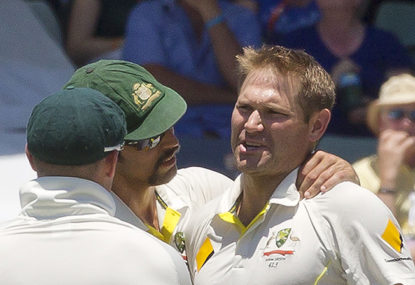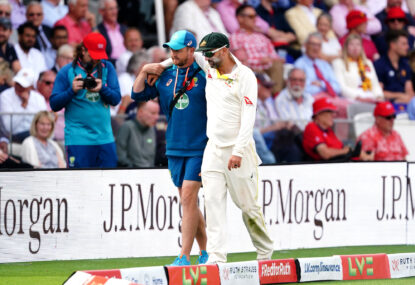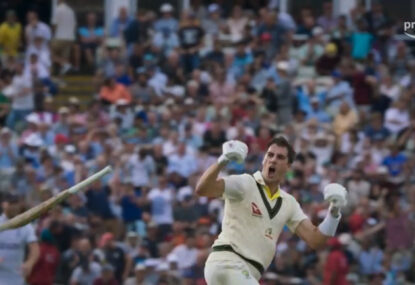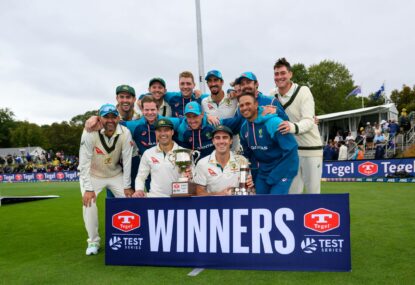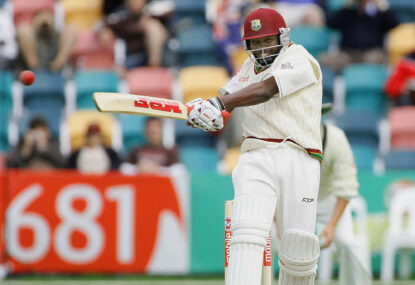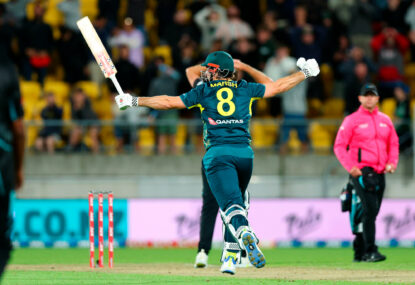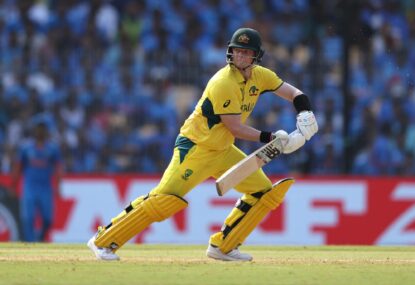The sports medicine experts, who know a lot about their subject but don’t understand much about what they know, successfully encouraged great teams like the All Blacks and the baggy green caps to adopt a rotation policy.
The theory behind the policy is the bodies of super athletes are best protected by them training more than they played.
In the case of the All Blacks, the result of the policy was their worst performance ever at the Rugby World Cup, in 2007.
For the baggy green caps, the result was the mass collapse into continual injuries of one of the greatest potential line-up of fast bowlers Australia might have produced.
Moreover, the rotation policy resulted even in the batsmen losing confidence in their abilities to play at the highest levels, with the result of Australia sliding down the rankings of Test nations, and losing the Ashes.
It has been reported that batsmen in the Ashes squad were scared to go into the nets because the possibility of subsequent criticism would undermine their confidence and, more importantly, result in losing their place in the side.
I am on the side of those old-timers – like Ian Chappell and before him, the great Bill O’Reilly – that say modern coaches have too much influence on their players.
The notion here is that cricket, batting and bowling, is a relatively simple business that can be made unmanageably complicated when too much instruction and theory is loaded into the heads of the players.
What is needed in all sports from coaches is clarity about means and methods. With clarity, which will differ from player to player and position and position, comes an understanding of the essentials involved with the task.
Bill O’Reilly also believed too much coaching (he would call it bad coaching) can take away from the natural genius some players have been endowed with.
He himself was told my Arthur Mailey to change his unusual grip on the ball and his bouncy, kangaroo-hopping long run-up. Luckily he rejected this advice.
It is worthwhile to consider, too, the greatest batsman of all time, Don Bradman, never received formal batting coaching.
His method, with his circular back-lift, is at odds with the text book approach that has generally been taught from the earliest days of cricket.
Warwick Franks, a cricket scholar, has pointed out recently that O’Reilly bowled 97.4 eight ball overs, 38 maidens, 185 runs and five wickets at the first Ashes Test at the Gabba in February 1933.
A week later, The Tiger bowled another 60 overs!
“Meanwhile,” noted Franks, “lavender water and cold compresses are pressed to the fevered brows of our contemporary cosseted darlings, plus the odd skinfold test.”
Quite.
The current selectors are to be congratulated then for keeping together the team that has won the first three Tests so splendidly in the 2013/2014 Ashes series. If it ain’t broke, as Shane Warne – the great captain, along with Keith Miller, Australia never had – points out.
There has been much discussion in cricket circles at the number of the current baggy green caps who are over the age of 30. With the extreme monetary rewards now available for successful cricket players these days, I’d say 30, in cricket terms, is the new 26.
Players can make a career out of cricket that is so financially rewarding they really don’t have to worry, like even the greats of the past and the even recent past, about establishing a real career when their careers are finished.
Also remember that Jack Hobbs scored a hundred first class centuries after his 40th birthday.
Of the present squad I’d say only Chris Rogers is perhaps vulnerable in the short term, and by that I mean during the next series against South Africa, if he falls out of form. But if he keeps on scoring runs, there is no reason for him to be dropped.
His nudging, pushing, behind-the-wicket game provides a contrast to the forthright, front-of-the-wicket smashing game.
George Bailey, in my view, has done enough to stay in the side for the next series, at least. He provides the hitting number six slot that has served Australia so well over the years.
I’m an ancient and Bailey reminds me of Les Flavell, who came into the Australian XI at an older age and provided, like Bailey, the toughness to take the fight back to the opposition when things aren’t going well for the team.
Both Flavell and Bailey get on with the game, and that is the Australian way. Bailey’s demolition of James Anderson at Perth with 28 off a single over to allow for an early declaration was the most emphatic statement of the intent to get on with the game by attacking rather than defending, which is the usual English way.
The really major decision with the team that needs to be made sooner or later (sooner in my view) is promoting Steven Smith to the vice-captaincy.
Ian Chappell suggests Smith or David Warner are likely future Australian captains.
I would rule out Warner on a number of grounds we needn’t go into right now, except to say Warner is a one-off who is best used by the team in just getting on with his individualistic game. He plays best as a free spirit. Darren Lehman has unleashed him and the good results are obvious from the statistics.
I was talking recently to a student of cricket with an ear to the inside thinking and he told me the expectation is Smith’s batting may well decline slightly over the years and his bowling will come on a lot more, rather like Richie Benaud in his career.
Like Benaud, too, Smith has an unflustered authority about his captaincy. He was calm and calculating for the Sixers, changing his bowlers carefully and thoughfully, while Warner launched a massive attack for his Thunder’s team at the SCG on Saturday night.
These are good days for Australian cricket. The hope is, and I expect it to be met, the momentum to crush England will continue at Melbourne’s MCG starting on Boxing Day.





























































































